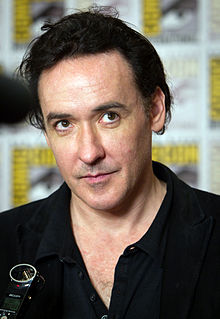John Cusack: Yes, in many ways, it's world-changing. Are Assange and Wiki leaks basically saying there's no one who'll do this journalism anymore, so we are compelled to do it? Or is he filling some other space, or trying to trump journalistic space. Legally, whats the difference? Why is he punished but the New York Times is not? They published his material.
I think you're saying it's such a vaster terrain than the Pentagon Papers that it may explain the frenzy -- when the publisher for the New York Times and reporters around Ellsberg release had to just say to themselves -- vietnam lies --all right, these guys are going to come after us -- Maybe we'll go to jail, maybe we won't. But they made the call, and they published it. Wikileaks is going after all governments all over the world.
Jonathan Turley: I think what Assange showed, more than any journalist or activist perhaps in history, is the sheer degree of duplicity and deception by this government and governments around the world.
John Cusack: You think the primary crux of it is the thing as a whole, not just the Bradley Manning case, or any specific revelation? Manning is just the fulcrom point to stop it and destroy them.
Jonathan Turley: Yeah, I think it's fascinating when you look at the reaction to Bradley Manning and Assange. The government really went to DEFCON 4 in dealing with these guys. And the question is why. I think the answer to that is they want to hoist the wretch. They want everyone to see these guys twisting in the wind, so no one will do this again.
And what is it that they did? They released --
John Cusack: They were whistleblowers.
Jonathan Turley: Right, they released information embarrassing to the government. But when you look at the media coverage, they clearly are unwilling to treat Assange as a whistleblower, and they are particularly unwilling to treat him as a journalist.
And so this sort of goes to this longstanding question of what constitutes a journalist in the age of blogs and Internet sites?
John Cusack: I guess that's probably the question I was stumbling towards -- what do you believe that difference is, from the constitutional perspective of freedom of speech, or its protection?
Jonathan Turley: Journalists have been adopting a very narrow definition because they have a legitimate concern that, with the ability to create a blog in a matter of minutes, everyone can claim to be a journalist. If everyone is a journalist, then no one will likely have journalistic privileges. Journalists survive on these privileges and those privileges will evaporate if everyone can claim them.
And so if you look at things like the National Press Club, they long have had a definition of a journalist that deals with how much the person gets paid to do journalism, excluding people who are legitimate journalists but are not receiving a full-time, or even a significant part-time, salary. Those definitions are highly artificial today. Most people are now getting their news from the Internet and from blogs.
Kevin McCabe: -- in a reference in a Times story, the reporter referred to Chris Matthews and Katie Couric as journalists, who would be attending the Al Smith dinner. And I was going to send a note saying Chris Matthews is no journalist. At one time he was a columnist. But he's a cable TV opinion guy now. I think that what you say just brings a striking relief to all of that. It's just so obvious.
Jonathan Turley: It also creates this awkward position, where if Adam Liptak at the New York Times releases material from Assange, it's a journalistic act. When Assange releases this information in bulk, it's considered a terrorist act. And nobody seems comfortable with trying to explain that distinction. And I'm not too sure that they can.
There's two ways to look at whether someone's a journalist -- their function and their motivation. And usually, we look at both. Well, what was the motivation of Assange? Assange's motivation, it seems to me, was clearly to be a whistleblower and to release this information. But he was also doing an act which is identical to what journalists do.
And yet, if you look at how he's treated in the newspapers, they're not treating him as either whistleblower or journalist; they're treating him somehow as sui generis, something unique. He's an Assange.
(Note: You can view every article as one long page if you sign up as an Advocate Member, or higher).





